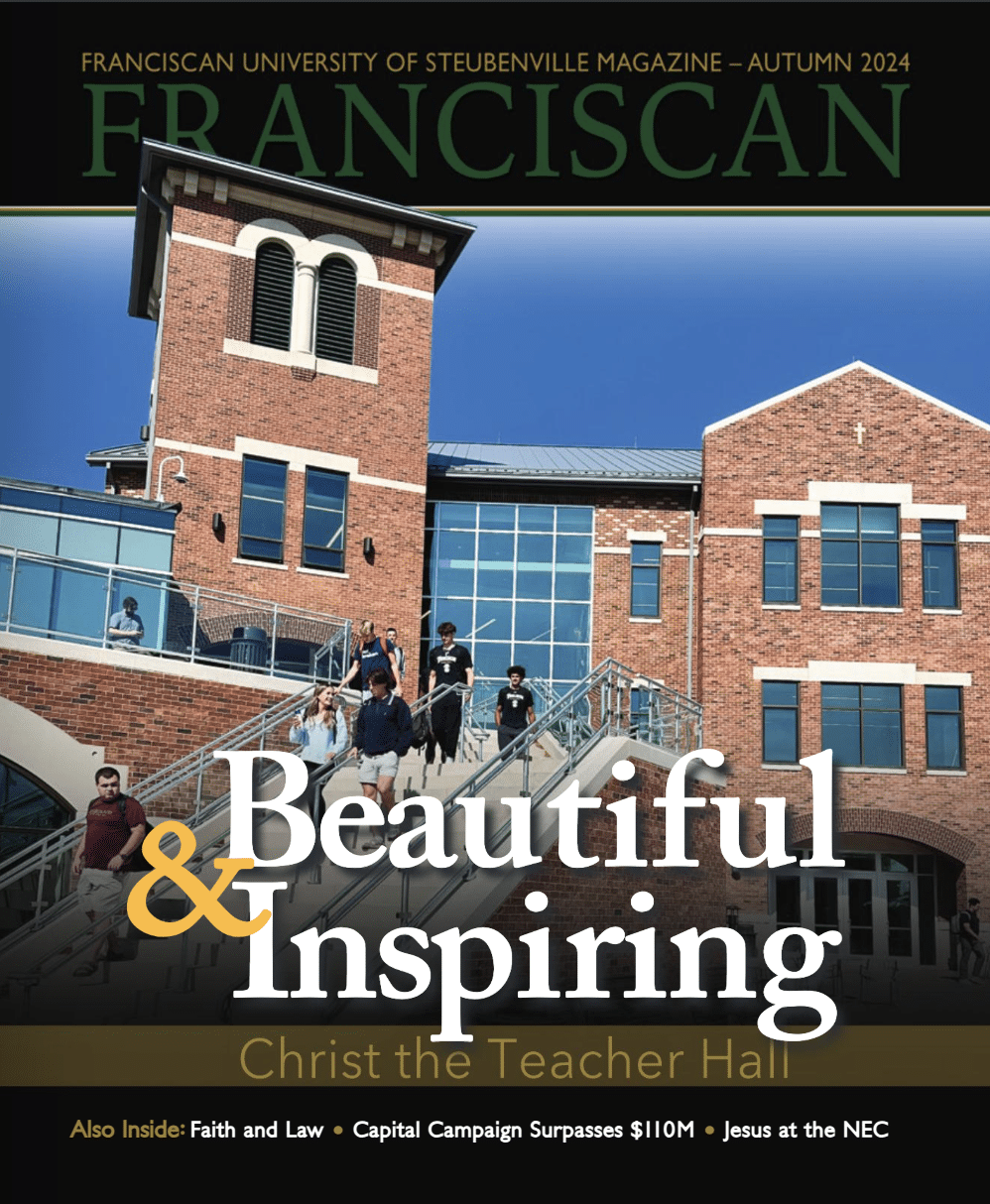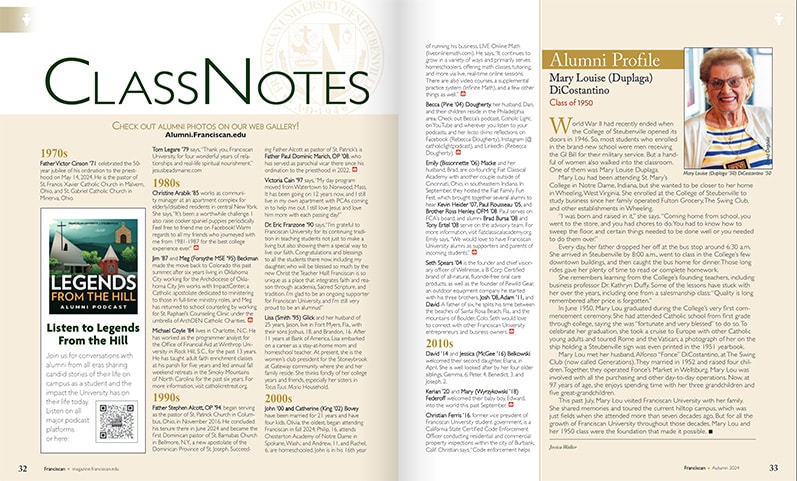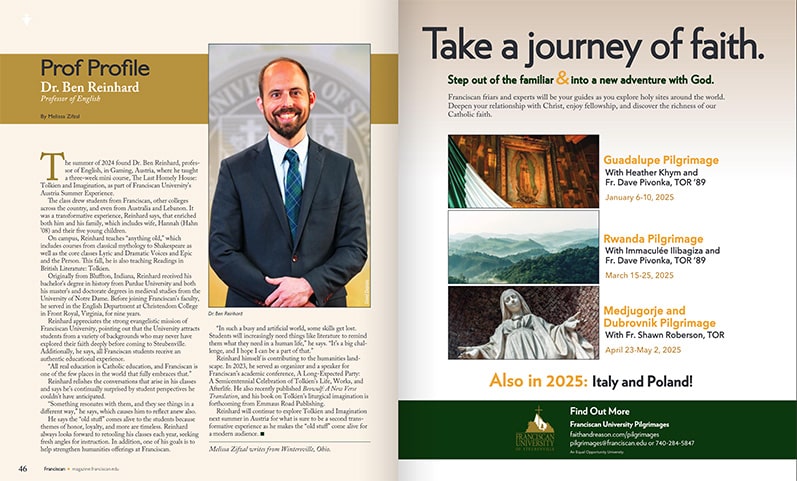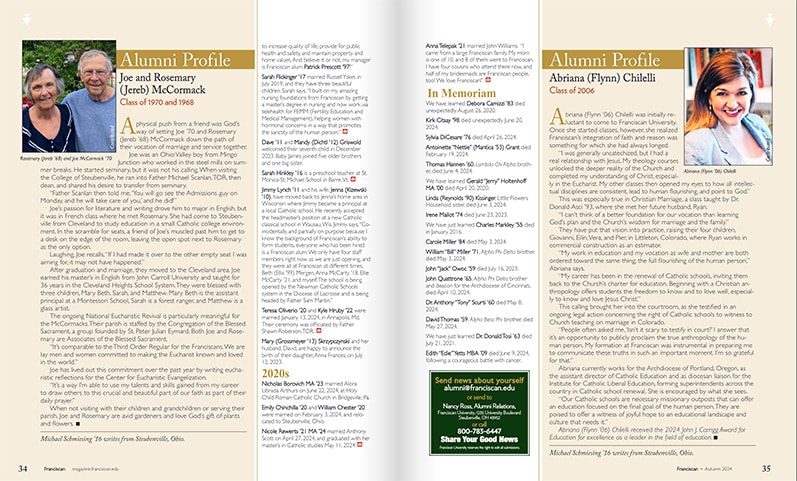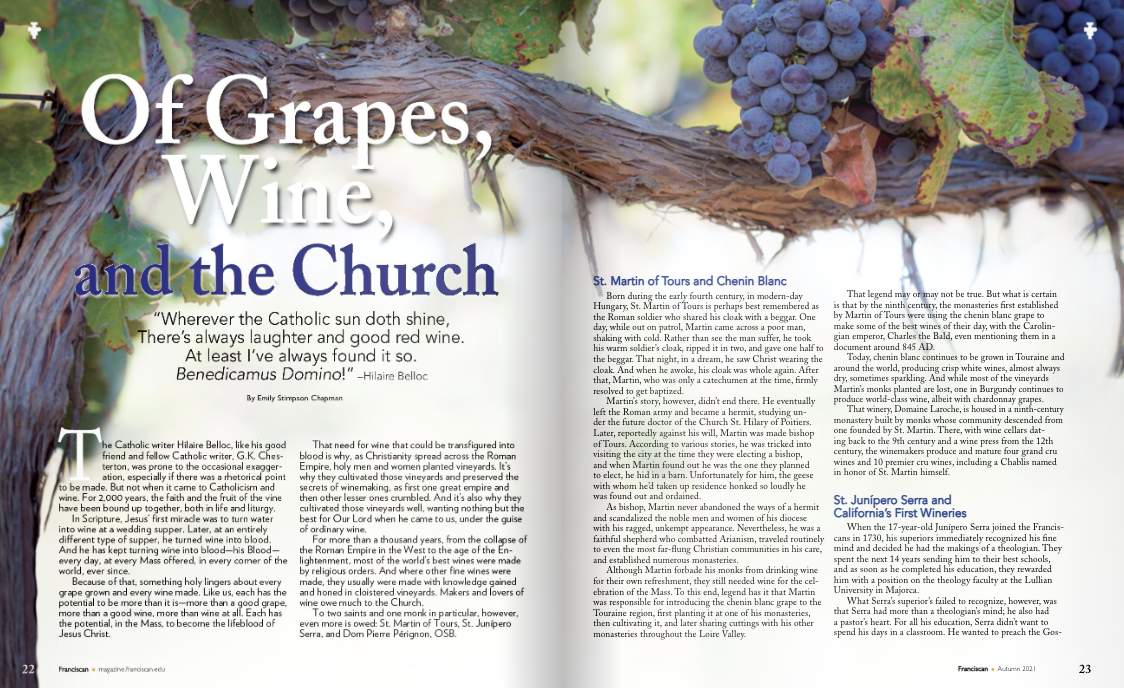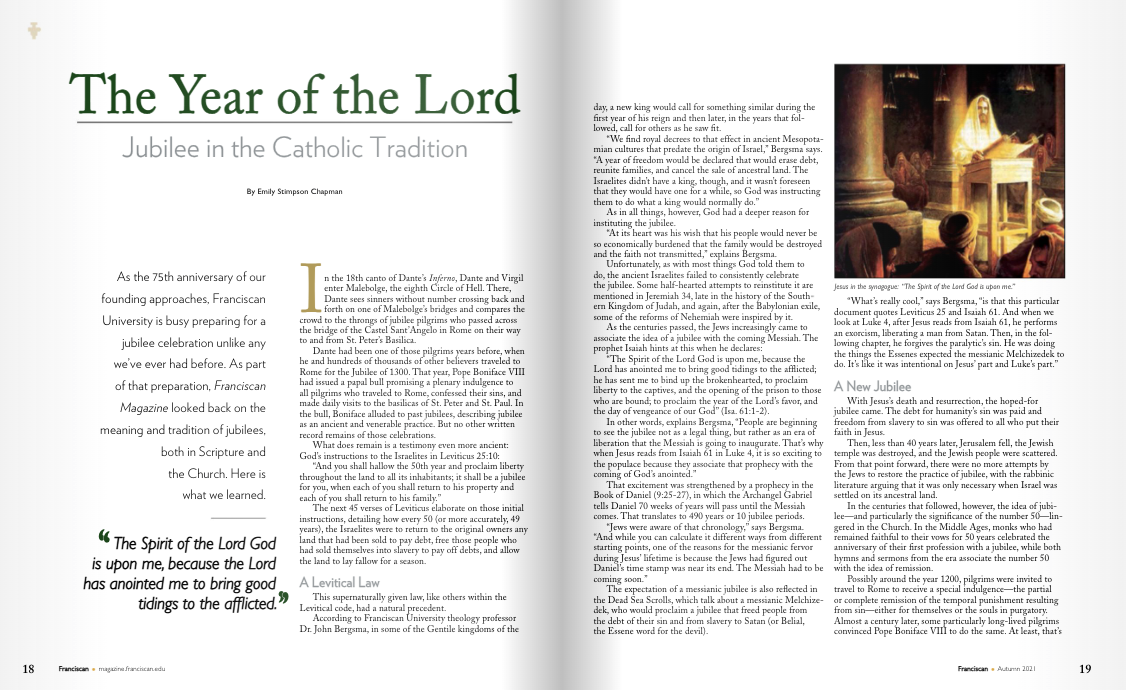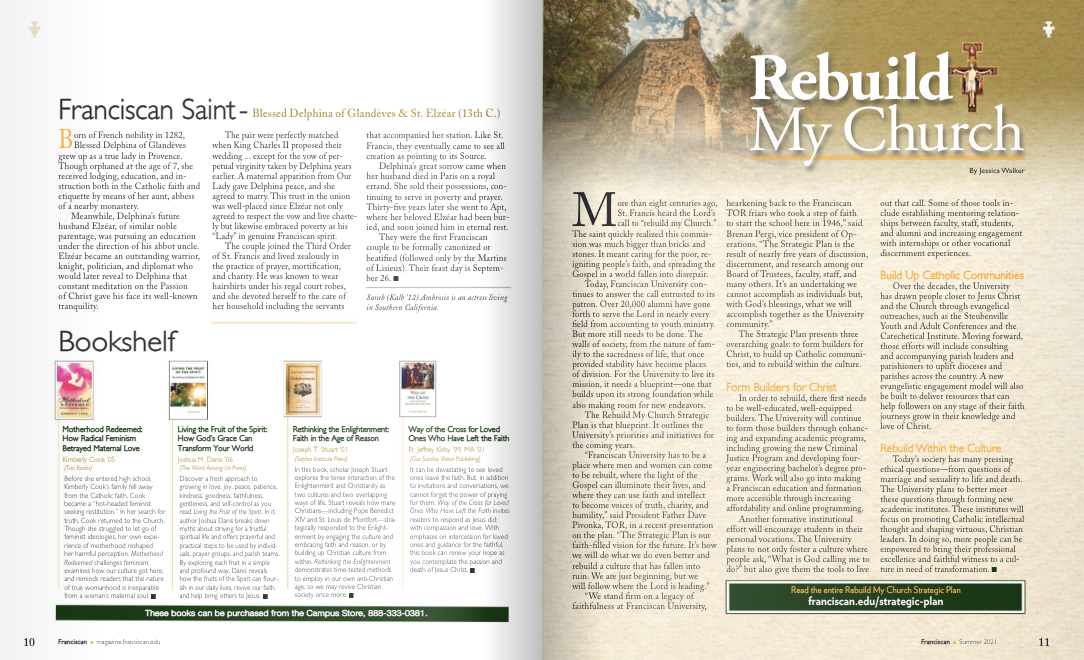Franciscan University president Father Dave Pivonka, TOR ’89, and theology professor Dr. Scott Hahn recently sat down to record an In Focus conversation about Scripture. Franciscan Magazine spoke with Scott afterward. We were swept into a theological tsunami of consciousness remarkably channeled along a particular narrative arc. This is our attempt (with Scott’s blessing) to turn four dimensions into an intelligible two while preserving the integrity of his original thoughts.
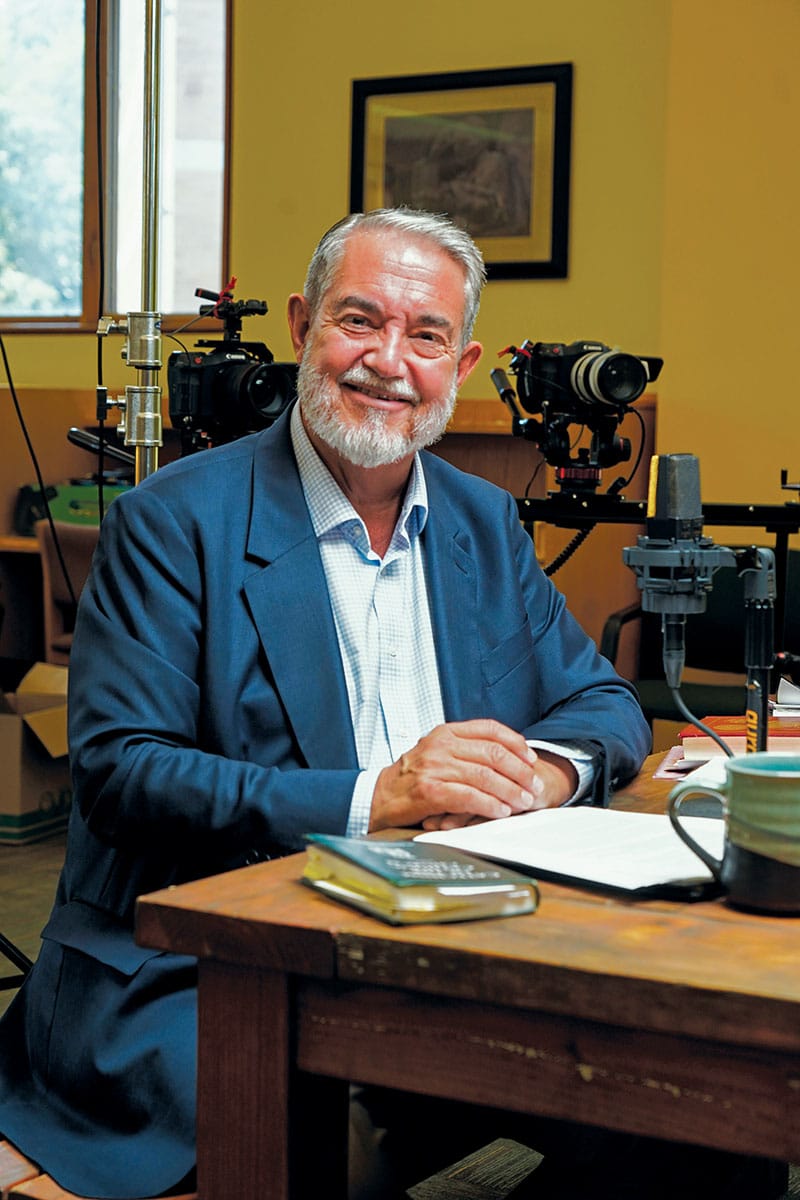
Dr. Scott Hahn on the set of Faith and Reason.com’s new In Focus series
What’s the best way to read the Bible?
You can read it straight through. But I usually encourage people to start with the Gospels. Read them every day. Add an epistle.
You need the Old Testament, too, though. The New Testament is unintelligible apart from the Old, because you’re hearing about promises that are fulfilled. You need to know the promises, and the covenants and the oracles, and the parallels and the types.
For instance, Chronicles in the Old Testament shares many elements with the Gospel of Matthew. Like Matthew, Chronicles puts forth the notion of kingdom and the kingdom of God, which is hardly ever found in the Old Testament. And like Matthew it’s not a secular, temporal kingdom; it’s liturgical. David in Chronicles is explicitly a liturgical and prophetic king.
Chronicles lays out a paradigm of royal priestly primogenture that is fulfilled in Christ. Chronicles distinguishes and unites the royal and the priestly, the temporal and the spiritual. Another way to look at it is political versus liturgical. Samuel and Kings are political; Chronicles describes the same period of history, but in a liturgical way.
Another theme of Chronicles is Israel’s mission to the other nations. They weren’t the Chosen People for their own sake; they were God’s firstborn to witness to and bless the other nations. Matthew’s Gospel ends with the Great Commission— “Go and make disciples of all nations.” It’s the fulfillment of Israel’s prophetic mission to bless the nations.
How would you define prophecy?
Prophecy is the disclosure of what we could not know by scientific experiment, philosophical logic, historical investigation, or any other natural means by which we come to natural knowledge of the natural order. Prophecy is when you communicate truth that goes beyond your own natural capacity.
Peter at Pentecost in Acts 2 quotes Psalm 16 and refers to David as a prophet. All these Davidic passages and Psalms are treated as prophetic by the Apostles. Think of Psalm 22. David never had his hands and feet pierced; they weren’t counting his bones. The charism of inspiration is an aspect of prophecy. The sacred authors were not taking mechanical dictation from God. The divine author is the principal author, yes, but this doesn’t make the Scriptures 90 percent God and 10 percent human, or 60-40. It’s 100-100; it’s fully human and fully divine, like the Word Incarnate.
Likewise, after Pentecost, the priests who pronounce human words over earthly matter turn it into the Creator and Redeemer of the universe. The Holy Spirit enables ordinary people to show that the word of God is not merely informative, it’s performative, with a transformative result. We’re forgiven. We’re healed. The debt is paid back, and then some. We’re made partakers of divine nature.
That’s too good to be true. But what if it is true? Then suddenly the 12 articles of the Creed help you theologically interpret what happens in history. “I believe in God, the Father almighty”—you’ve got an all-powerful Father, and he sends the Son. And in Jesus’ birth and on the cross and when he descends into Hades, it’s a manifestation of a love stronger than death that transforms death into liturgy and grace.
Explain how David is a prophetic king.
There really is a sense in Chronicles that David’s been given a charism of prophecy. Infused in his heart is this awareness that not only will the Christ come from him, but he’s a prototype of him.
The Only-begotten Son, the firstborn among many brethren, is the Father’s firstborn. This is the only thing for which the world was made. The Incarnation is not Plan B; the Incarnation of the Second Person of the Trinity in the Blessed Virgin through the power of the Holy Spirit—this is all the predestined Plan A. There’s a prototype, a scale model if you will; and the Chronicler is showing it.
The Chronicler sees that Israel was chosen from the beginning to be the firstborn among the nations, that all creation was ordered to that election. His eschatology is fulfilled in Jesus Christ, the firstborn of God. Christ is the purpose of all human history, and the way all people receive God’s blessing.
The Chronicler shows David is moving from Sinai to Zion. Sinai has a tabernacle that excludes the Gentiles, and the Torah is kept only by the 12 tribes. Zion’s temple has a court for the Gentiles, and it’s the largest precinct of the structure. Gentiles are not only allowed into the temple area, they’re invited to sing the Psalms of David and learn the wisdom of Solomon.
There’s movement from the silent worship of Sinai to the songs and music of Zion. The Chronicler captures that David’s greatest achievement is the praise and worship of God’s real presence in the ark in the temple, 24/7.
King David received the pattern for the temple from God, like Moses received from God the pattern for the tabernacle. Both were patterned after the heavenly sanctuary. When Isaiah writes about being in the Holy of Holies, he’s not in the earthly temple, he’s in the heavenly sanctuary.
What did Isaiah see in his vision? He saw the glory of God, the Lord on a throne, “lifted up.” And the seraphim couldn’t look upon it. The seraphim are the highest of the choirs of angels, and sing holy, holy, holy, but they cover their faces.
Jesus says he will be “lifted up” (John 12:32), and John explains this is the meaning of Isaiah’s vision, that he “saw his glory” (John 12:41). God’s glory is Christ lifted up on the cross. The glory, the strength, the power, the wisdom, the goodness of God are only manifested when the Son of Man is lifted up.
If you look on the cross, you are healed, but if you are one of the seraphim you can’t; the direct vision of the love of God will blind angelic eyes.
So how do we look on the Christ lifted up with human eyes?
With the eyes of faith. We look beyond the host and see the resurrected, ascended, glorified Lord, the Lamb, standing as though slain, and risen. He is what Isaiah could see with the seraphim, and why Isaiah said, “Woe is me, I am doomed to die.”
Curiously, Isaiah says, “I’m a man of unclean lips.” It’s the year King Uzziah died. In Chronicles, Uzziah was the king who got the temporal and spiritual flipped backwards. He extended Israel’s boundaries further than anybody. So, he thought, I can extend my boundaries in the temple. So, he went into the holy place. Azariah and 80 priests tried to stop him. He became angry with them—and turned into a leper. So, the priests threw him out of the temple into a makeshift royal leper house, where he died.
Isaiah knows he is in a land of uncleanness. He has seen the true priest-king in his vision, and what the true priest-king is doing (“lifted up”) is what even the seraphim can’t look upon.
The Incarnation and Redemption, the story of salvation in Scripture, is a mystery that the human mind can’t grasp by reason. And yet we can’t grasp it apart from reason. So, reason has to be elevated. You know what happens to Jesus’ flesh—it’s pierced. In a certain sense, the intellect has to be pierced with mysteries that are more powerful than we are able to grasp.
Scripture isn’t mythology; it isn’t make believe. It’s real. It’s the word of God in the words of men. It is incarnational mystery, the Word made flesh and the Word made page.
Christ lifted up is the burning vision of the love of God.
Celeste (Gregory ’93) Fortenberry writes from Lincoln, Nebraska.
Watch Dr. Scott Hahn’s new video series “Scripture Changes Everything,” hosted by Father Dave Pivonka, TOR ’89, at FaithandReason.com/In-Focus.



